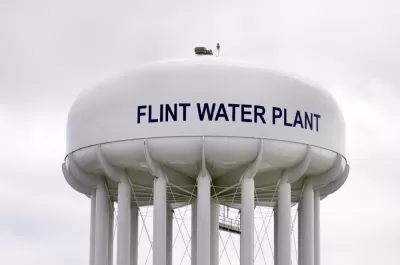Flint residents are suing the U.S. Environmental Protection Agency for damages caused by exposure to lead in the city's drinking supply.

"More than 1,700 Flint-area residents and property owners have filed suit against the U.S. Environmental Protection Agency for the 'mishandling' of the city’s water crisis in a legal action seeking more than $722.4 million in damages," reports Jim Lynch.
The U.S. EPA cleared the way for the lawsuit when it failed to respond to an administrative claim last year, explains Lynch. The article includes a breakdown of the failings of the EPA, as alleged by the complaint. The $722.4 million figure "is a cumulative figure representing total damages claimed for various property and health issues," according to Michael Pitt, an attorney representing the plaintiffs, who is quoted in the article.
The article also includes a detailed history of the back and forth between the U.S. EPA and the Michigan Department of Environmental Quality regarding the blame for the disaster with Flint's water—as well as the blame for the slow response to the crisis.
"A year ago, former EPA Administrator Gina McCarthy vigorously defended her agency before a U.S. House of Representatives committee hearing," according to Lynch. "The crux of her March 17 defense was that the EPA was kept in the dark about details of the water crisis through poor communication from Michigan’s Department of Environmental Quality."
Earlier in January, the Associated Press reported that Flint's water system had been restored to minimum federal standards for quality. That news was met with skepticism by many observers of the Flint crisis, however.
FULL STORY: Flint residents seek $722M over water crisis

Alabama: Trump Terminates Settlements for Black Communities Harmed By Raw Sewage
Trump deemed the landmark civil rights agreement “illegal DEI and environmental justice policy.”

Study: Maui’s Plan to Convert Vacation Rentals to Long-Term Housing Could Cause Nearly $1 Billion Economic Loss
The plan would reduce visitor accommodation by 25% resulting in 1,900 jobs lost.

Why Should We Subsidize Public Transportation?
Many public transit agencies face financial stress due to rising costs, declining fare revenue, and declining subsidies. Transit advocates must provide a strong business case for increasing public transit funding.

Paris Bike Boom Leads to Steep Drop in Air Pollution
The French city’s air quality has improved dramatically in the past 20 years, coinciding with a growth in cycling.

Why Housing Costs More to Build in California Than in Texas
Hard costs like labor and materials combined with ‘soft’ costs such as permitting make building in the San Francisco Bay Area almost three times as costly as in Texas cities.

San Diego County Sees a Rise in Urban Coyotes
San Diego County experiences a rise in urban coyotes, as sightings become prevalent throughout its urban neighbourhoods and surrounding areas.
Urban Design for Planners 1: Software Tools
This six-course series explores essential urban design concepts using open source software and equips planners with the tools they need to participate fully in the urban design process.
Planning for Universal Design
Learn the tools for implementing Universal Design in planning regulations.
Smith Gee Studio
Alamo Area Metropolitan Planning Organization
City of Santa Clarita
Institute for Housing and Urban Development Studies (IHS)
City of Grandview
Harvard GSD Executive Education
Toledo-Lucas County Plan Commissions
Salt Lake City
NYU Wagner Graduate School of Public Service


























